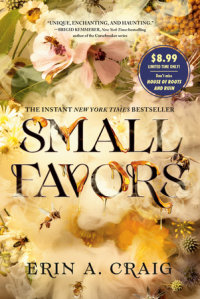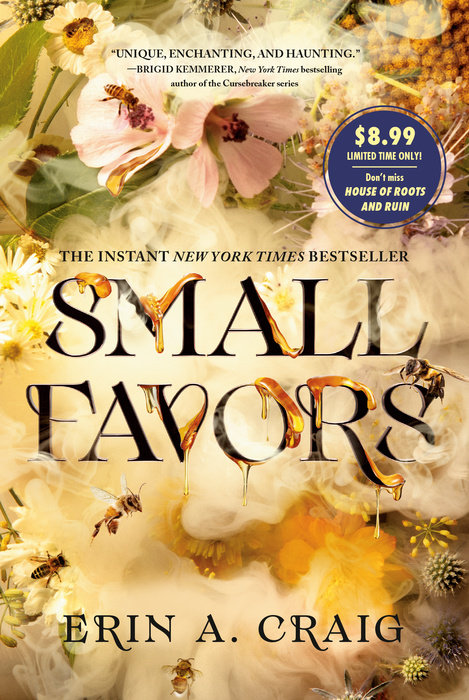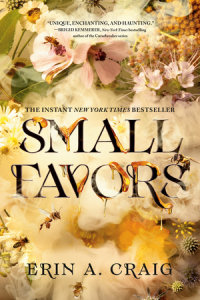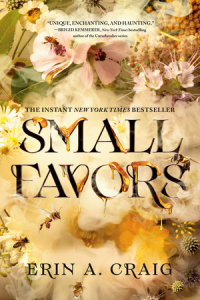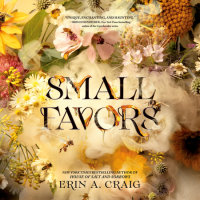Small Favors
THE INSTANT NEW YORK TIMES BESTSELLER • From the critically-acclaimed author of House of Salt and Sorrows comes a mesmerizing and chilling fairy-talesque novel about Ellerie Downing, a young woman in a small town with monsters lurking in the trees and dark desires hidden in the shadows—in Amity Falls, nothing is more dangerous than a wish come true.
Ellerie Downing is waiting for something to happen. Life in isolated Amity Falls, surrounded by an impenetrable forest, has a predictable sameness. Her days are filled with tending to her family's beehives, chasing after her sisters, and dreaming of bigger things while her twin, Samuel, is free to roam as he wishes.
Early town settlers fought off monstrous creatures in the woods, and whispers that the creatures still exist keep the Downings and their neighbors from venturing too far. When some townsfolk go missing on a trip to fetch supplies, a heavy unease settles over the Falls.
Strange activities begin to plague the town, and as the seasons change, it's clear that something is terribly wrong. The creatures are real, and they're offering to fulfill the residents' deepest desires, however grand, for just a small favor. These seemingly trifling demands, however, hide sinister intentions. Soon Ellerie finds herself in a race against time to stop Amity Falls, her family, and the boy she loves from going up in flames.
"Unique, enchanting, and haunting."—Brigid Kemmerer, New York Times bestselling author of the Cursebreaker series
“Sweet, dark, and complex as wildflower honey.”—Hannah Whitten, New York Times bestselling author of For the Wolf
“Small Favors is an eerie fairytale that I couldn’t put down.”—Alexis Henderson, author of The Year of the Witching
An Excerpt fromSmall Favors
1
The smoke smelled of burning pine needles, dark and sweet. It seeped from the hive box in front of me and danced across the fields, caught on a balmy breeze. Papa pressed down on the bellows to release another cloud, training it carefully toward the tall wooden structure’s entrance. His head bobbed as he silently counted the passing seconds. Finally he nodded.
Even though my hands were completely covered, they shook as I approached the hive. I’d never been allowed to help remove frames before, and I wanted to make sure I did everything exactly as Papa said. With a muffled groan, I strained to hoist the heavy lid before setting it aside in the grass, careful to avoid three drowsy bees crawling across its top.
After puffing more of the smoke deep into the box, Papa stepped back, allowing me full access to the hive. “Take out one of the super frames and we’ll inspect it.” His voice was muffled under the thick netting swagged about his face.
Though I could only see the limned highlight of his profile, he looked pleased. Proud, even. I prayed I wouldn’t let him down.
Usually I was in the kitchen with Mama, Merry, and Sadie during harvests. Samuel helped Papa, bringing in the heavy, honey-laden frames for us to process. I’d hold them upright while Mama ran a wide knife down the combs, slicing off waxy caps with practiced ease. The dripping frames would go into a large metal drum, and Merry and Sadie would take turns cranking the handle until all the honey had spun free and was ready to be filtered.
I glanced toward our farmhouse now, imagining my sisters jostling for space around the hearth as bottles were boiled clean and set out to dry. They’d be squabbling and begging for Mama to let them go out. It was too pretty a day to be spent over a hot fire and iron pots. A hawk screeched overhead in tacit agreement, spinning lazy circles in the late-August sunshine.
“Ellerie,” Papa prompted, drawing me back. “The first frame can be the trickiest. Sometimes the bees seal the edges over with resin. You might need to chisel it free.”
“Won’t that upset the bees?” I peered down through the slats of the frames. The ever-present hum had died down, but I could still see some movement in the lower boxes.
“Not if you do it right,” he teased unhelpfully. I sensed his smile behind the netting. “The first time my father let me take the frames out, I was stung six times. It’s a rite of passage.”
Growing up with beekeepers for parents, I’d certainly been stung before, but it wasn’t an experience I cared to repeat. I’d kept the entire household up with my first sting, sobbing through the night—not for my swollen hand but for the poor bee who had died in the process.
Reaching under my own heavy netting, I wiped at the sweat trickling down my face, debating where to start. There were eight frames in this section, each spread out with uniform precision. I chose one near the middle and gently wiggled it back and forth, testing the sides. It moved easily enough. I held my breath as I pulled it free, careful to not brush it against any of the others on the way out.
“Let’s see, then.” Papa leaned forward, studying the bees’ work.
Lacy patterns of honeycomb sheeted over the frame, some filled and capped but most empty.
He clucked his tongue, considering. “Not yet. Could be a late harvest this year. Too much snow last winter. Put it back.”
With the utmost care, I eased the wooden frame back into its slot, then breathed a sigh of relief.
“Now the next.”
“We check every one?”
His head bobbed. “If you go through the trouble of smoking the bees, you need to make sure to thoroughly inspect the hive. Honey isn’t the only thing we’re concerned with. We’re stewards for the hives, protectors of these bees. We need to make sure they’re healthy and their needs are being met.”
He set the smoker down and lifted the top box, peering into the lower chambers. After setting aside the first box and counting the second’s frames, he took one out, and gently brushed aside two bees clinging drunkenly to the combs.
“Tell me what you see.”
I squinted through the veil. There were more honeycombs, as golden as a stained-glass window. At the center of almost every cup was a tiny white speck, no bigger than a barley seed. “Those are the eggs, aren’t they?”
“Very good. What do they tell us?”
I felt uncomfortably on the spot, like a knobby-kneed schoolgirl no older than Sadie. “That the queen is laying?” He made a noise of affirmation, encouraging me to go on. “So if she’s laying, that’s good, right? A healthy hive?”
He nodded. “It means the hive is queenright.” He pointed to the eggs, his usually sure and swift movements hampered by the thick gloves. “Eggs this size mean there was a queen here at least three days ago. When you check the boxes, you always want to look for fresh eggs. A box without them is a dying swarm.”
He deposited the frame back and removed another, showing me the grubs, fat white blobs that looked nothing like the buzzing honeybees soaring about our yard. Another frame contained the pupas, cocooned away in caps of honey, growing and dreaming.
“Those will break free in only a few days’ time,” Papa said approvingly. “New workers or drones. Our hive is thriving, Ellerie. Let’s put everything back together and let them wake up. We’ll check on the honey next month.”
“And they’ll all be okay?”
I hated the note of worry in my voice. I knew they would be. Papa had never lost a colony before. But seeing how everything fit together, up close and right in my hands, reinforced what a fragile existence these bees had. Leave a frame out by accident, and the bees could crosscomb, filling up the extra space with so much honeycomb, you’d destroy the box trying to free it. Set the lid off-kilter, even slightly ajar, and the bees wouldn’t be able to regulate the internal temperature. They’d work themselves to death, fanning and buzzing to heat the hive.
“They’ll be just fine. You’ve done well today.”
My face flushed with pleasure. I’d wanted to impress him, to show him I was every bit as capable as Samuel was. Samuel should have been here, should have been wearing this veiled hat, not me. But he’d slipped off after breakfast this morning, and Papa’s face had grown as dark as a summer rainstorm sweeping across the mountain peaks.
Samuel had changed over the summer, racing off the farm with his best friend, Winthrop Mullins, as soon as chores were finished, sometimes even leaving the last of them to be divided up among us girls. He often quarreled with Papa, bickering over little annoyances until the two stood hot-faced, their noses curled into sneers. Mama said he must be sneaking off to see a girl, but I was at a loss to guess who it could be. We never kept anything from each other, my twin and I, and it seemed absurd to imagine him storing secrets now.
Once the box lid was securely tightened, I swooped down to pick up the metal smoker before Papa could, offering to carry it back to the supply shed for him. When we were a good distance away from the hives, he pulled off his hat, then balled up the netting and his pair of gloves into its center.
“I think this will be a good winter,” he predicted, swinging his arms back and forth as we walked. I smiled as he whistled a song through his teeth, hopelessly off tune.
“What’s that flower there?” he asked, pointing to a patch of pink blooms sprouting along the path.
I removed my hat for closer inspection. “Fireweed,” I exclaimed proudly.
He clicked in disapproval. “Its real name?”
I tried remembering the species, written in tiny scrawl in Papa’s botany book.
“Epilobium angustifolium?” I guessed, stumbling over the Latin.
Papa smiled. “Very good.”
“Maybe . . . maybe I could help with the next inspection too?” I asked, keen on taking advantage of his happy state.
He nodded, and my heart leapt. Papa was a man of few words unless you got him talking about his bees, and then he’d prattle on for hours.
I envied Sam, born just minutes ahead of me—and a boy. He’d stroll after Papa to the shed without a backward glance, confident and certain of his place in the world.
Not like me, stuck in the house, forever poised and waiting for the next step in my life. Waiting for a boy to come along and ease me into my next purpose. A wife. A mother.
Waiting.
Waiting.
Waiting.
Until today.
Inside the shed, I held on to the veiled hat for just a moment longer, fingers sunk deep in the netting. I was scared to let go and release the magic of the afternoon. But an angry vibration buzzed against my thumb. A stray bee was entangled in the mesh. I struggled to gently sort through the layers, trying to free the honeybee as her legs squirmed in rage.
“Don’t sting, don’t sting,” I whispered to her. “I’m only trying to help. You’re nearly free. . . .”
The stinger sank into the side of my finger as the air split in two with a howl of anguish.
It hadn’t come from me.
Papa rushed outside as more cries and shouts rose. This wasn’t the sound of a children’s game turned too rowdy. This pain wouldn’t be patched with a splint or a kiss on the knee. It echoed across the valley, becoming a confusing cacophony of desperate heartache.
“Ellerie, get your mother. We’re going into town.” Papa was already halfway to the path leading into Amity Falls.
Another scream rang out, sharp and shrill, and a cold sweat trickled down my neck despite the warm afternoon. My feet remained still and unmoving. I did not want to know what was behind such torment.
“Ellerie!” Papa urged, sensing I wasn’t behind him.
I tossed aside the hat, my finger swelling uncomfortably. The body of the honeybee spilled free from the netting and fell into the dirt, already dead.
